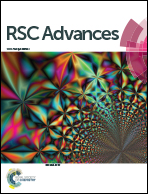Abstract
This study deals with an investigation of how substitution of an alcohol group by a thiol group in mixtures of choline chloride with a series of bio-sourceable molecules affects the physico-chemical properties of the mixtures and their ability to dissolve metal oxides. All of the thiol mixtures studied showed a higher affinity and selectivity for late transition metals and the physical properties of the mixtures were improved compared to their alcohol analogues (i.e. lower viscosity, wider liquid range). The metal solubility was assessed via determination of the final concentration of the metal oxides dissolved in thiol mixtures via inductively coupled plasma optical emission spectroscopy (ICP-OES). The thiol function selectively improved the solubilities of the late transition metal oxides (i.e. copper and zinc), which are valuable metals often present as residue in industrial waste. The solubility of iron oxides was much lower than that of the valuable metals, which is a significant benefit in industrial applications. The different solubilization behaviour of metal oxides in the thiol and alcohol mixtures was further investigated via UV-vis absorption and infrared spectroscopy. This study allowed the potential of these deep-eutectic solvents for the selective recovery of metals to be assessed.



 Please wait while we load your content...
Please wait while we load your content...